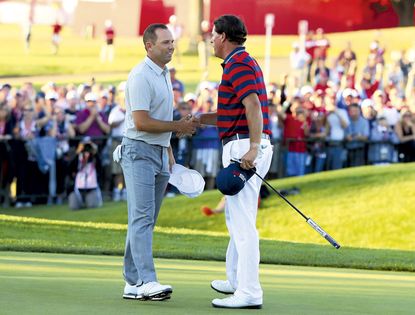“It’s just not cricket”


Robert Green argues that when it comes to sportsmanship, golf stands head and shoulders above the rest and sets an example other sports should follow
You have, of course, heard someone say “It’s just not cricket.” You are likely to have said it yourself. But I rather think that instead the phrase should be “It’s just not golf.” Cricketers appeal for catches they haven’t made, sledge their opponents and indulge in general macho buffoonery. Where’s the sportsmanship in that? As golfers, we trust one another not to improve a lie, to keep the correct score, to respect one another when it’s our respective turns to play. In terms of behaviour lessons for life, it’s as much of a contest as Australia vs Austria (in either sport).
In his recent autobiography, Watching The Wheels, racing driver Damon Hill, who at the time was the world champion, remembered Tom Walkinshaw, owner of the Arrows team by which he had just been hired, telling his sponsors: “Basically, if you want to win in F1, you’ve got to cheat…”
Hill was appalled. He was effectively being called a fraud. “My father taught me not to cheat,” he wrote. “I never do it, not even when playing golf on my own! What’s the point? I could just write down 70 and call myself a scratch golfer and never hit a ball.” It was no accident he cited golf as his example. Hill continued: “In golf, the rules are well known, change very little and are respected by the players because this gives their sport an integrity that is difficult to find in life.” Bang on.
The beautiful game
One of the least glorious aspects of football is ‘simulation’ (we’ll ignore Jose Mourinho’s mindless mind games). Footballers frequently dive in order to attempt to gain a penalty or have an opponent sent off. They appeal for corners when they know it’s a goal kick. Trying to get an illicit edge is what they do. They berate match officials with a plethora of what we euphemistically call four-letter words.
The credibility of athletics has essentially diminished to the extent that, to a cynical public, the contest comes down to whose chemist has lately performed a personal best. Cycling? Do we need to go there? Well, certainly not to the top of Mont Ventoux. The title of Lance Armstrong’s first autobiography, in 2000, was It’s Not About The Bike. We know, Lance – it’s about the blood.
Get the Golf Monthly Newsletter
Subscribe to the Golf Monthly newsletter to stay up to date with all the latest tour news, equipment news, reviews, head-to-heads and buyer’s guides from our team of experienced experts.
Why golf?
So why is golf the way it is and surely always will be, even post President Trump? The late Herbert Warren Wind, doyen of American golf writers, explained it like this. “Golf grew up as ‘the gentleman’s game’ because of the unique dimensions and character of the playing area… since the play of each golfer could not be superintended, it was up to each man to obey the rules.”
He added: “When you and I were playing a friendly match, I did not sprint across the fairway to make sure you didn’t ground your club in a bunker…In a stroke play tournament, when you and I disappeared around the bend to play the 8th and 9th, where there was no one to watch us, it was up to us not to cheat; if we gave each other lower scores than we made, this would affect every player in the field.”
In golf, the course, rather than the man opposite you, is usually ‘the enemy’. Perhaps that is part of the reason for its integrity. It’s mostly less personal. Obviously I’m not saying golf is devoid of gamesmanship but as pointed out by Stephen Potter, who wrote the seminal book on the subject, and with reference to what Wind said, if your opponent is in a bunker, you don’t stand over him counting out aloud his efforts to extricate himself. Marlon Samuels displayed no such compunction about ridiculing Ben Stokes after his wayward final over helped West Indies to beat England in the T20 World Cup final.
In some sports there is probably a generational dimension in play. Many a batsman in the halcyon days would head for the pavilion without needing sight of the umpire’s finger when he knew he’d gloved the ball to the wicketkeeper, whereas nowadays DRS, Hot Spot, Snickometer have first to be exhausted.
Regarding Damon Hill’s remarks, in 1958 Stirling Moss lost his best chance of becoming the Formula 1 world champion he would never be because he defended his chief rival, Mike Hawthorn, at a steward’s hearing, thereby enabling Hawthorn to retain the points he might have lost which would later have made Moss the champion. That wasn’t the dynamic on display last season between Lewis Hamilton and Nico Rosberg – and they were teammates.
Approaching 50 years ago in the Ryder Cup, golf’s most fervent cauldron, Jack Nicklaus conceded that putt to Tony Jacklin. We recall it not as a glorious one-off but because it exemplifies the game. How’s that?
The author’s blog is at robertgreengolf.com and you can follow him on Twitter @robrtgreen
David joined Golf Monthly in 2015 as a content editor for the magazine and regularly contributes to the website. He has worked in magazine publishing and editing since 2003. He is a keen golfer and up until recently was a member of Blackmoor Golf Club in Hampshire. He has covered various big events and tournaments for GM, the highlight of which was witnessing Tiger Woods win his 15th Major at Augusta in 2019. Email: david.taylor@futurenet.com
-
 'Gator Netting Is In Place' - Chevron Championship Venue Prepared For 'Safe' Winner's Jump
'Gator Netting Is In Place' - Chevron Championship Venue Prepared For 'Safe' Winner's JumpA tradition which began at the tournament's previous home could continue this year - if the champion is feeling brave enough...
By Jonny Leighfield Published
-
 New Balance 997 SL Golf Shoe Review
New Balance 997 SL Golf Shoe ReviewNew Balance produce some extremely stylish footwear and, in this review, Matt Cradock takes their spikeless 997 SL onto the course
By Matt Cradock Published